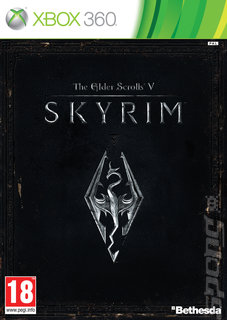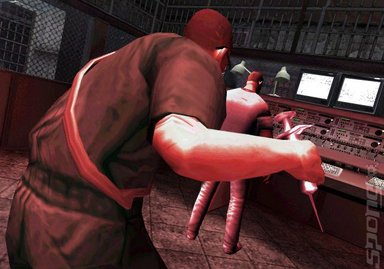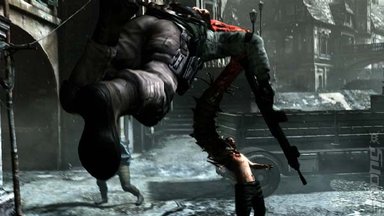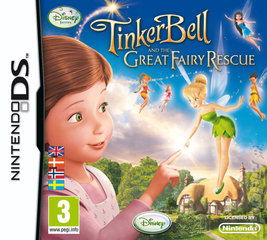Companies:
BBFC
See that pack shot to the right? There's probably something about it that looks a little incongruous to you right now. That would be the PEGI 18 rating. As things stand, games don't make it to UK store shelves with a PEGI 18 rating on them.
If its content merits an 18 rating from PEGI, then by law it needs to have a legally-enforceable BBFC rating on it. Later this year probably by July that's set to change. A legitimate question to ask at this point is will this affect game sales?
Come July(ish) the BBFC will stop rating games and that job will fall solely to PEGI (Pan European Games Information), an industry body whose ratings will then become legally enforceable. (Fun fact: PEGI games expected to get a rating of 12 or higher will go to the UK's Video Standards Council for final judgement. The VSC is one of the organisations that oversees the BBFC. It's a glorious circle of bureaucracy).
Here's a thing Skyrim, rated 18 by PEGI, was only given a 15 by the BBFC. You can see that from the second pack shot. This is by no means unusual. As the chap who puts up most of the pack shots in the mighty SPOnG database, I can tell you that a significant number of games rated 18 by PEGI are graced with a 15 by the BBFC. Despite what you might expect from a body that's industry-run and therefore - you'd have thought - more industry-friendly, PEGI is more conservative in its ratings than the BBFC at least at the top end of the scale.
Indeed, the organisation itself notes in a letter that was basically aimed at a disgruntled 10yr-old who wanted to play Battlefield 3, PEGI is considered relatively strict, but also very accurate when rating games because a wide range of academics, games specialists and other experts have been involved in setting the criteria and shaping the organisation.
You might debate the reason for its strictness. I would argue it's one of two factors. Either, a) to be left alone by alarmist third parties PEGI seeks out the conciliatory appearance of conservatism, or b) the fact that its ratings have to reflect attitudes from a number of countries/cultures leads PEGI to skew higher than the BBFC, which only has Brits to answer to.
Either way, this could legitimately be a cause for concern among publishers. A game getting a legally-enforceable 18 rating as opposed to a 15 potentially cuts out three years' worth of customers.
Film studios regularly punt for a 12 rating rather than a 15 or 18, hoping to maximise their audiences. A few years' worth of customers can be crucial, especially in lean times.
Sadly (and I do kind of mean 'sadly' here) this is unlikely to be a problem. A friend recently wondered aloud why Hollywood worries itself about getting those all-important 12 ratings while BBFC 18/PEGI 18/ESRB M rated Call of Duty games and their ilk are routinely among the year's best-sellers and are, in many cases, bigger business than Hollywood's biggest hitters. The answer is, unfortunately, that in spite of their ratings kids still get to play Call of Duty games.
You might make the argument that adults just have a bigger adult audience than films, but do you really think that publishers would pass up all those 12-15/18yr-old dollars and pounds if they thought they were actually still sat on the table?
It's not very popular to say this at least not loudly and publicly but the elephant in the room when we're all getting annoyed at the mainstream press for demonising games is that we know kids get their mitts on them.
I want to be totally clear here: I am not blaming retailers. I don't think I've ever met a retailer who would knowingly sell games to under-age kids. I also absolutely believe that adults should be able to play whatever they damn well want. I also don't think publishers go out of their way to target kids. I'm sure they're quietly aware, though, that copies of 15 and 18 rated games are getting bought for kids.
Where there's a problem, as most people involved with games are aware, it's with parents' and the general public's understanding of games. It doesn't matter how many bloody [PROTOTYPE2] adverts many middle-aged parents see in their heads gaming is still Pacman and Atari 2600s.
At least the BBFC rating is something they've seen on A Nightmare on Elm Street and they have an understanding of that (quite possibly, admittedly, from when they saw it aged 12). No amount of education is going to convince them that little Jimmy isn't mature enough at age 11 to play Resident Evil 6, though. I know one mum who says that dealing with pester power is too much of a hassle and stopping her 12yr-old from playing CoD just isn't worth the bother especially when he can just go round to his mate's house and play it there. At least she's actually informed on what he's playing.
We have almost reached the point where PEGI is only unknown to parents if they deliberately choose to ignore video games entirely, says Simon Little, MD of PEGI, in his organisation's 2011 Annual Report. Maybe. But knowing and caring are not the same thing.
So, to answer the question we started with PEGI ratings will only affect games sales when parents decide that there's any sort of game rating at all that concerns them. That's unlikely to be any time soon.
If its content merits an 18 rating from PEGI, then by law it needs to have a legally-enforceable BBFC rating on it. Later this year probably by July that's set to change. A legitimate question to ask at this point is will this affect game sales?
Come July(ish) the BBFC will stop rating games and that job will fall solely to PEGI (Pan European Games Information), an industry body whose ratings will then become legally enforceable. (Fun fact: PEGI games expected to get a rating of 12 or higher will go to the UK's Video Standards Council for final judgement. The VSC is one of the organisations that oversees the BBFC. It's a glorious circle of bureaucracy).
Here's a thing Skyrim, rated 18 by PEGI, was only given a 15 by the BBFC. You can see that from the second pack shot. This is by no means unusual. As the chap who puts up most of the pack shots in the mighty SPOnG database, I can tell you that a significant number of games rated 18 by PEGI are graced with a 15 by the BBFC. Despite what you might expect from a body that's industry-run and therefore - you'd have thought - more industry-friendly, PEGI is more conservative in its ratings than the BBFC at least at the top end of the scale.
Indeed, the organisation itself notes in a letter that was basically aimed at a disgruntled 10yr-old who wanted to play Battlefield 3, PEGI is considered relatively strict, but also very accurate when rating games because a wide range of academics, games specialists and other experts have been involved in setting the criteria and shaping the organisation.
You might debate the reason for its strictness. I would argue it's one of two factors. Either, a) to be left alone by alarmist third parties PEGI seeks out the conciliatory appearance of conservatism, or b) the fact that its ratings have to reflect attitudes from a number of countries/cultures leads PEGI to skew higher than the BBFC, which only has Brits to answer to.
Either way, this could legitimately be a cause for concern among publishers. A game getting a legally-enforceable 18 rating as opposed to a 15 potentially cuts out three years' worth of customers.
Film studios regularly punt for a 12 rating rather than a 15 or 18, hoping to maximise their audiences. A few years' worth of customers can be crucial, especially in lean times.
Sadly (and I do kind of mean 'sadly' here) this is unlikely to be a problem. A friend recently wondered aloud why Hollywood worries itself about getting those all-important 12 ratings while BBFC 18/PEGI 18/ESRB M rated Call of Duty games and their ilk are routinely among the year's best-sellers and are, in many cases, bigger business than Hollywood's biggest hitters. The answer is, unfortunately, that in spite of their ratings kids still get to play Call of Duty games.
You might make the argument that adults just have a bigger adult audience than films, but do you really think that publishers would pass up all those 12-15/18yr-old dollars and pounds if they thought they were actually still sat on the table?
It's not very popular to say this at least not loudly and publicly but the elephant in the room when we're all getting annoyed at the mainstream press for demonising games is that we know kids get their mitts on them.
I want to be totally clear here: I am not blaming retailers. I don't think I've ever met a retailer who would knowingly sell games to under-age kids. I also absolutely believe that adults should be able to play whatever they damn well want. I also don't think publishers go out of their way to target kids. I'm sure they're quietly aware, though, that copies of 15 and 18 rated games are getting bought for kids.
Where there's a problem, as most people involved with games are aware, it's with parents' and the general public's understanding of games. It doesn't matter how many bloody [PROTOTYPE2] adverts many middle-aged parents see in their heads gaming is still Pacman and Atari 2600s.
At least the BBFC rating is something they've seen on A Nightmare on Elm Street and they have an understanding of that (quite possibly, admittedly, from when they saw it aged 12). No amount of education is going to convince them that little Jimmy isn't mature enough at age 11 to play Resident Evil 6, though. I know one mum who says that dealing with pester power is too much of a hassle and stopping her 12yr-old from playing CoD just isn't worth the bother especially when he can just go round to his mate's house and play it there. At least she's actually informed on what he's playing.
We have almost reached the point where PEGI is only unknown to parents if they deliberately choose to ignore video games entirely, says Simon Little, MD of PEGI, in his organisation's 2011 Annual Report. Maybe. But knowing and caring are not the same thing.
So, to answer the question we started with PEGI ratings will only affect games sales when parents decide that there's any sort of game rating at all that concerns them. That's unlikely to be any time soon.
The opinion expressed in this article is that of the author and does not reflect those of SPOnG.com except when it does.
Want to vent your gaming spleen? Send 900 words max of well thought-out, deeply analysed opinion and we may even run it. Send in 900 words of incisive but mostly brutally angry invective, and we almost certainly will.
Companies:
BBFC
Read More Like This
Comments
My boss's wife had made the same excuse. "it isn't worth the bother to stop him playing CoD, all he would do is go and play it at a friends house" he is 11! I thought about showing her some cut scenes from Dead space 2 to make her more aware of what could be in a game!
@gingineer Exactly. The fact you can't outright stop something doesn't mean you should make it easy!
more comments below our sponsor's message
I prefer the BBFC ratings because it seems clearer to me, and having one rating system across the entertainment board definitely helps. Having said that, I have actually seen a few PEGI 18-rated games in some places like GAME.
Surely Hollywood is worried about 12 ratings because film tickets are sold for at most a quarter of the price of games so they have to sell four times the tickets to take the same amount of money as a game?
It's only in takings that games are outperforming film, not in numbers sold.
It's only in takings that games are outperforming film, not in numbers sold.
@DrkStr They do have to sell more to make the same money - at least if you're only looking at box office. But Blu-ray prices are around the same as many lower-tier and budget releases (which, while they don't make a lot of headlines, are very important for publishers) and Hollywood has a longer tail on its products than a lot of games publishers thanks to not having the same pre-owned problem. That said, I don't know how streaming is affecting that.
None of which matters that much, since regardless of how much a publisher makes per unit, they'd all still like to make more. If younger teens were actually sat there as an untapped market for your Skyrims and your CoDs, don't doubt for a second that publishers would clean up their content.
None of which matters that much, since regardless of how much a publisher makes per unit, they'd all still like to make more. If younger teens were actually sat there as an untapped market for your Skyrims and your CoDs, don't doubt for a second that publishers would clean up their content.





